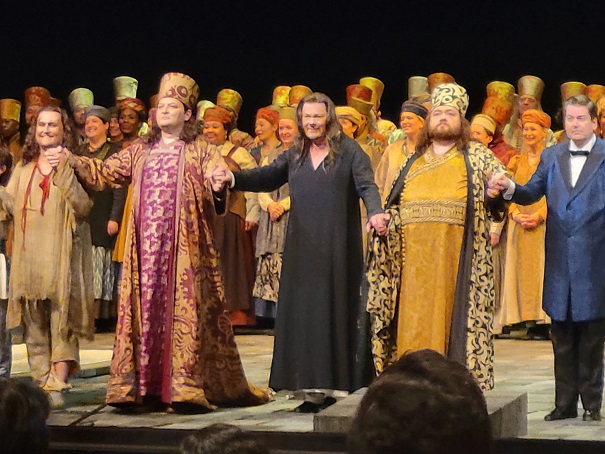Concert Diary: “Boris Godunov” at the Metropolitan Opera
October 9, 2021
New York, N.Y.
The last time I saw Modest Mussorgsky’s Boris Godunov at the Metropolitan Opera, the title role was sung by the great Finniish bass Martti Talvela. As I reported in my college newspaper,
Standing 6 feet, 7 inches, Talvela is an imposing and dominating stage presence. He has a strong voice and combines his singing, acting, and appearance in a totally convincing portrayal of this towering and complex part. Talvela also submits to obviously brutal physical punishment in his acting. When he falls down a flight of stairs at his death, the entire audience gasps.
That was January 1975, and I guess I didn’t feel inclined to soil that memory by seeing another production right away. I broke that long fast this afternoon.
Boris Godunov was Tsar of Russia from 1598 to 1605, in the period between the death of Ivan the Terrible (1584) and the rise of the Romanovs, who ruled from 1613 to 1917. Ivan was succeeded by his second son, the pious Feodor, during whose reign Boris Godunov served as regent. Feodor would have been succeeded by Ivan’s third son Dmitry, but Dmitry died in 1591 at the age of 10.
At the time, it was widely believed that Boris Godunov had Dmitry put to death, although modern historians doubt that. Regardless, during Boris’s reign and thereafter there arose at least three pretenders to the throne. These were the False Dmitry’s who claimed to be the real Dmitry who escaped assassination.
This is all grist for great drama. Pushkin’s verse-play of Boris Godunov dates from 1825 and assumes that Boris had the real Dmitry put to death and thereafter felt much guilt about it. Scenes of the tormented Boris are mixed with scenes of the rise of the first False Dmitry, who approaches Moscow as the play progresses. (This first False Dmitry actually became Tsar of Russia after Boris’s son Fyodor was assasinated two months into his reign.)
Mussorgsky used Pushkin’s play as a source for his libretto, cutting Pushkin’s 23 scenes down to an economical 7, with two central scenes devoted to the False Dmitry. His first version of the opera was finished in 1869, but it was rejected by the Russian Imperial Theater purportedly because it had no major female character. Mussorgsky added a couple scenes (and eliminated an objectionable scene) for an 1872 version. In 1896 and 1908, Rimsky-Korsakov reorchestrated the opera to fix what were perceived to be mistakes of harmony and orchestration.
Eventually, Mussorgsky’s unorthodox orchestration and harmonies came to be acknowledged not as “wrong” or “inept” but as modern and original and essential to Mussorgsky’s concept of music and the opera. When I saw the opera at the Met in 1975, they were performing an amalgam of the 1869 and 1872 versions using Mussorgsky’s original orchestration, which was unusual at the time. For the current Met production, Mussorgsky’s original 1869 version is used, which allows the opera to be performed without an intermission in about 2 hours 20 minutes.
This was my first time in the Metropolitan Opera House in 19 months, and it sure felt weird sitting right next to strangers without any plexiglass partitions. However, we were aided in our psychological comfort by a diligent checking of proof of vaccination before even entering the lobby, and by a mask requirement. I’m sure it seems just as weird to the singers as they look out one an entire masked audience.
Our Boris was German bass René Pape, who I’ve seen numerous times before, not surprising considering that his bio in the program tells us that he’s been on the Met stage over 200 times in 22 different roles. This was a brooding Boris in contrast to the towering Boris I remember in Martti Talvela. I was very much persuaded of his love for his daughter Xenia and his young son Feodor, who was sung as a trouser role by the engaging mezzo-soprano Megan Marino.
Boris’s [plot spoiler] death was not the house-shaking body thud I remember from 1975, but a retiring turning-into himself following a farewell to his children that I found very moving.
The sets in this production are lean and unobtrusive, allowing us to focus on the characters and the chorus, which generally functions as the voice of the Russian people.
Here’s a curtain call showing a little part of that chorus with René Pape in the black robe in the center:
